Researchers warn cancer-causing virus can lurk in your throat
The new study is claimed to be pivotal for the prevention of oropharyngeal cancers.

Washington: It has come to light that cancer causing virus may hide in small pockets on the surface of tonsils in throats of unsuspected people.
The virus known as Human Papilloma Virus (HPV) is the culprit behind cervical and some form of head and neck cancer. The new study, carried out by researchers from the University of Rochester Medical Center, claimed to be pivotal for the prevention of oropharyngeal cancers, i.e. tonsils and tongue cancers.
The study noted that by mid-adulthood, most people have been exposed to HPV. The same strains that are known to cause cervical cancer, mainly HPV 16 and 18, cause head and neck cancers. While verified tests exist to detect HPV in people before they develop cervical cancer, the same cannot be said for HPV-related head and neck cancers, which are expected to outnumber cervical cancer cases by 2020.
Only about five percent of HPV-infected people will develop cancer of the mouth or throat, suggesting most people's immune systems can easily hold back HPV infections. Associate professor of Otolaryngology and Neurosurgery at URMC, Matthew Miller, M.D., found HPV encased in biofilm inside pockets on the tonsil surface, called tonsil crypts, which is where the HPV-related head and neck cancers often originate.
Miller along with Katherine Reith, M.D., the study co-author and an Otolaryngology resident at URMC, studied tissue samples from 102 patients who had elective tonsillectomies. Five of those samples contained HPV and four contained high-risk strains, HPV 16 and 18. In every case, HPV was found in tonsil crypts biofilm.
The group claimed to believe that HPV is shed from the tonsil during an active infection and gets trapped in the biofilm, where it may be protected from immune attack. In the crypts, the virus likely lays in wait for an opportunity to reinstate infection or invade the tonsil tissue to develop cancer.
"Given the lack of universal HPV immunization and the potential for the virus to evade the immune system even in individuals with detectable HPV in their blood, our findings could have far-reaching implications for identifying people at risk of developing HPV-related head and neck cancers and ultimately preventing them," Miller said.
Now, the team plans to further investigate potential screening tools, such as an oral rinse, to detect HPV in the mouth and throat. The next step would be to develop topical antimicrobials that would disrupt the biofilm and allow the immune system to clear the virus. The research is published in Journal of the American Medical Association.

